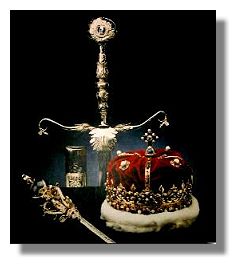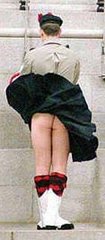 Welcome back to Scotophile Monday! All sources credited. Enjoy!
Welcome back to Scotophile Monday! All sources credited. Enjoy!
500th Anniversary of Sword of State
A reception was held in Edinburgh Castle on Tuesday to celebrate the 500th anniversary of the Sword of State of Scotland. The sword was presented to King James IV in 1507 as a gift from Pope Julius II, and is one of the three elements of the Honours of Scotland - Scotland's Crown Jewels. The other elements are the Crown and the sceptre. In the 17th century, Oliver Cromwell ordered that all regalia should be broken up. However, the Scottish Crown Jewels were hidden in Dunnottar Castle and successfully smuggled out to Kinneff Parish Church, when the castle was besieged. The jewels were again hidden after the Act of Union, when they were locked in a chest and lay forgotten in Edinburgh Castle. That was until 1819 when a group, which included Sir Walter Scott, set out to recover them. The Sword is now on permanent display in the Crown Room at Edinburgh Castle. It is 1.4 metres long with images of St. Peter and St. Paul etched into the blade. The silver gilt handle incorporates overlapping oak leaves and acorns taken from the Pope's coat of arms. The Scottish crown jewels are the oldest set of Crown Jewels in the British Isles and second oldest in Europe
Scotland "Independent in 10 Years"
On the day before the Scottish National Party (SNP) published its first budget and economic strategy, First Minister Alex Salmond boldly predicted that Scotland would be "independent in 10 years." Previously, he has been reluctant to put a time-scale on the nationalist aspiration for Scotland leaving the United Kingdom. His declaration comes not long after an opinion poll, organised by the Scottish Centre for Social Research, suggested that only 23% supported independence, its lowest point in 10 years. The bill bringing forward a referendum on independence is unlikely to be passed in the Scottish Parliament as Labour, Conservatives and Liberal Democrats oppose it. But the SNP will be hoping to win more seats at the next elections in 2011 and would then be free to go ahead with a referendum. Whether there would be a majority of Scots voting for independence in such a poll at that time will depend on a lot of factors.
Recycling Target Ahead of Schedule
The slow speed with which the UK has implemented recycling of household waste has resulted in the country being dubbed the "dustbin of Europe". In 2001, we recycled just 5% of our municipal waste. But local authorities have been galvanised into action in recent years - the threat of European Union financial penalties providing a better motivation than thoughts of "saving the planet". Now, Scotland is already close to the 2008 target of recycling 30% of waste. Recycling figures for the latest quarter - April to June 2007 - reached 33.4 per cent. The area with the highest recycling rate in the most recent quarter was Moray, which recycled 46.6% of its waste but Glasgow recycled the least, at only 19.5%. Britain is still sending more waste to landfill than any other country in the European Union - some countries recycle twice as much as in the UK.
Campaign to Save Islands in Decline
Representatives from most of Scotland's 95 inhabited isles met on Mull this week to establish the "Scottish Islands Federation," to lobby for action on the problems facing these remote communities (where a total of around 100,000 people live). There was a call for the appointment of a government minister dedicated to promoting island interests and, if possible, a committee at Holyrood to monitor progress. A major concern is the long-running decline in the numbers living on the islands, with many young people leaving for jobs on the mainland, leaving behind aging communities hovering on the brink of extinction. The population of Lewis has fallen from 24,000 in 1961 to below 20,000 in 2001. However, other islands have seen an increase - Orkney has risen from 13,495 in 1961 to 15,315 in 2001 as a result of the oil boom. And Skye has seen its population go up from 7,478 in 1961 to 9, 232, much of it in recent years as a result of the Skye road bridge which removed the need for a ferry crossing.
Visitor Center Takes the Biscuit
The first-ever visitor centre dedicated only to "shortbread" opened this week in Huntly in Aberdeenshire. Shortbread is a type of biscuit (cookie) which is traditionally made from one part white sugar, two parts butter, and three parts plain white flour. Shortbread is so named because of its crumbly texture (from an old meaning of the word short). The cause of this texture is its high fat content, provided by the butter. The new centre has been created by Dean's of Huntly, which began 30 years ago when Helen Dean began making shortbread to raise funds for Huntly Pipe Band. Now the firm is the number one Scottish retail brand of shortbread, employing more than 140 people, with a turnover approaching £7 million.
This Week in Scottish History
November 19 1600 - King Charles I born.
November 19 1960 - "National Service" which required all fit young men to train in the armed forces, was brought to an end.
November 20 1863 - Death of James Bruce (8th Lord Elgin) who had served as Governor-General of Canada (1847-54) and India (1862-63). As a special envoy to China he burned down the emperor's Summer Palace in Beijing, destroying countless works of art, in order to induce the emperor to sign a treaty.
November 21 1673 - King James VII married Mary of Modena.
November 21 1835 - Poet James Hogg, the Ettrick shepherd, died in Ettrick.
November 21 1918 - German battle fleet surrendered to the allies at Scapa Flow in Orkney.
November 21 1958 - Construction began on the Forth Road Bridge.
November 22 1515 - Birth of Mary of Guise, the French Queen Consort of James V. She was regent of Scotland during the minority reign of her daughter, Mary, Queen of Scots.
November 23 1332 - Edward Balliol formally acknowledged King Edward III of England as his feudal superior.
November 23 1909 - Historical novelist Nigel Tranter born in Glasgow. He was the most prolific Scottish writer of all time, writing mainly factual and fictional books related to Scottish history.
November 24 1331 - David II (aged 7) crowned at Scone.
November 24 1572 - John Knox, leading reformer of Church of Scotland, died.
Delay for Culloden Visitor Center
The Battle of Culloden in 1746 lasted for about an hour, but the recreation of the sights and sounds of the conflict in the new Culloden Visitor Centre has resulted in lengthy delays to the opening of the new facility. The National Trust for Scotland had originally planned to have the new state-of-the-art centre, beside the battlefield east of Inverness, open in April of this year, in time for the main tourist season. The replacement centre features the "ghosts" of more than 50 characters who witnessed events surrounding the 1746 battle in which the army of Prince Charles Edward Stuart was crushed by the Duke of Cumberland's government forces. Digitally-created images will guide visitors through the horror of 1746 by way of groundbreaking audio-visual technology, using a personally-controlled directional sight and sound system. It is this which has resulted in the opening being delayed "until August" and then "early November". The existing visitor centre closed last weekend and the new one is now expected to open its doors in "late November".
Scottish Inventions
Radar - Sir Robert Watson-Watt (1892-1973)
Born in Brechin as Watson Watt (without the hyphen) and a direct descendant of the inventor James Watt, he developed an early interest in radio waves. After World War I, he began to look into how aircraft could be detected by the distortion of radio signals. The basic principles of radio-wave reflection and electromagnetic waves had been established by another Scot, James Clerk Maxwell. "Radar" was short for "radio detecting and ranging" and radar development was first started elsewhere. But Watt created the first workable radar system, turning the theory into one of the most important war-winning weapons. Watson Watt became the superintendent of the radio division of the National Physics Laboratory in Teddington. By 1936 his radio stations were able to detect aircraft up to 70 miles away. It was due to the network of radar stations he proposed that the over-stretched resources of the RAF were able to be in the right place at the right time, as Luftwaffe aircraft streamed over the English Channel during the Battle of Britain from August to October 1940. Watt went on to develop airborne interception radar that helped night fighters detect attacking bombers in the dark. In 1942 Watson-Watt (he had hyphenated his name by this time) was awarded a knighthood.
All of the above are from the Rampant Scotland.com newsletter.
Scottish Film
Video and audio clips. Many vintage. Scotland on Film
Jacobites!
The real Jacobite rising of 1745 ended in disaster. Could you do any better? Find out!
On This Day
Scottish History day by day. RSS feed available.
Scotland's Unsigned Music Podcast
Scotland Introducing
Battle Royal Over "Ancient" Salmon Fishing Rights
MORE than 600 years ago the tiny fishing hamlet of Inverbervie was elevated to the privileged status of a Royal Burgh by a grateful King David II after local fishermen came to his rescue when his ship was wrecked on the rugged Mearns coastline. The Royal decree he granted in 1342 gave villagers the right to "tak reid fish" - salmon - from the mouth of the River Bervie which flows into the North Sea at the Kincardineshire town. But now furious residents claim their ancient fishing rights are under threat from plans by the Dee District Salmon Fisheries Board to bring in the angling association from nearby Stonehaven to run the fishery on a stretch of the river where it is claimed locals have been poaching salmon by using illegal lead weighted lines to "rip" the fish from the water. Read more
19 November 2007
Scotophile Monday
at
8:26 AM
![]()
Labels: Scotophile Monday
Subscribe to:
Post Comments (Atom)





















1 comment:
I wouldn't be so sure that the referendum bill will not be passed by Holyrood.
It is indeed likely to be passed if two possible scenarios exist. The first being the current situation where there seems little support for Independence (or separation as the unionist media likes to paint it)and therefore the likely answer would be a resounding, NON!
A more pleasant scenario is one in which the people demand one, having seen how well the SNP Government performs with both hands tied behind its back.
The unionists would be committing political suicide to go against the demands of the people with an election in May 2011.
Post a Comment